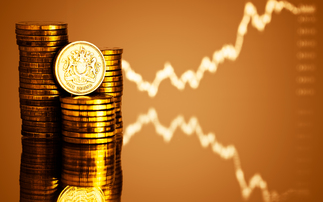In 1983, when the late Ralph Quartano, chief executive of the just-established PosTel Investment Management, strode out to challenge the Marks & Spencer board over ‘special' loans to directors, there was no ESG - or any of the host of other pseudonyms including sustainable, responsible and ethical that this ‘socially conscious' style of investing has since been tagged.
Quartano was simply doing the right thing by the PosTel investors. Under his leadership, PosTel, which later evolved into Hermes Investment Management and now the international business of Federated Hermes, may have helped begin the ESG journey but for a long time it was a road-less-travelled.
Until relatively recently, ESG was a niche concern for a small group of investors who correctly saw that responsible allocators of capital must look beyond the bottom-line financials for a broader understanding of return, and risk.
Further on down the road
We have come a long way since Quartano first put his foot forward on the responsible investment path in 1983. According to some measures, as at the end of 2020 more than $40tn is now in ESG-aligned investments while about 40% of managers make some claim to responsible (or the like) credentials.
Investment managers have responded to the demand for ESG strategies from asset owners including pension funds by developing a swathe of product offerings that sit on a spectrum of priority in terms of the returns to society.
In some sense this suggests that we have progressed from a narrow view in which only pure financial metrics, derived from traditional balance sheet, P&L, or cash flow statement, mattered, to a world in which we take a more holistic view of financial returns.
Just a few years ago a consultant friend told me that under 200 funds in their investment universe were classified as responsible or sustainable: now the same ESG product subset is numbered in the thousands.
Of course, this growth represents genuine progress, but it also includes some instances of re-labelling without underlying change, a practice known as ‘green-washing'.
Picking up the pace: four reasons why ESG is now the way
First, reputation is now a key motivation for corporates, with beneficiaries focused on their moral stance and ethical beliefs.
Back in the ‘90s this movement started with protests against the then apartheid regime South Africa; later tobacco came under the spotlight; and subsequently, numerous UN conventions highlighted certain repugnant activities (such as cluster bomb munitions) for investors to avoid.
Secondly, investors have become increasingly aware that there are risks associated with ESG factors that must be taken into account. In climate change terms, we group these into physical, transitional and societal. We know the necessary reduction in the use of fossil fuels required for the survival of life-as-we-know-it will lead to stranded assets, for example - and we must accept this.
Thirdly, the canny investor sensed an opportunity - and with one eye to the future, a link was made between longer-term financial returns and matters of sustainability. The current pandemic, where the most resilient companies have clearly performed better, has validated this point.
Lastly, the seers of our industry spotted the wider impact of their actions, understanding that in a world where there are explicit planetary boundaries, a social licence to operate matters.
New directions: where regulations are pointing
We believe ESG is an essential component of investment fiduciary obligations - a view increasingly reflected in regulations.
Governments are pushing both for investment firms to take ESG into consideration at a high level and for better granular data to improve implementation.
Although disclosure of ESG information has been improving globally, there is still far too much variability. This is an invitation to regulators to step in, and indeed that is what is happening.
The EU will keep us busy with sustainability-related disclosures and the Non-financial Reporting Directive based on its Taxonomy.
In the UK, TCFD-aligned information moves to a comply-or-explain regime in June this year. Other jurisdictions including India and Thailand have similar ESG reporting regulations in train.
Change is coming too for the accounting industry. The IFRS Foundation, the body that oversees the work of the International Accounting Standards Board (IASB), is proposing setting up a parallel Sustainability Standards Board - if it comes to fruition, the SSB would make it possible for the holy grail of integrated reporting to be achieved, where the relationship between strict financial performance is clearly linked to sustainability outcomes.
Next steps for investors: how active choices can achieve real goals
From my perspective, however, the truly interesting commercial question revolves around which parts of ESG can or should sit alongside active management and which fit better with passive approaches.
I believe that use of backward-looking, historical ESG data lends itself well to a passive approach - and there may be scope for systematic players to forecast forward such information. But the active industry can justify its worth in superior understanding of ESG information and the genuine application of stewardship.
In the investment industry we have huge responsibilities for the capital that we manage to the end beneficiaries that have entrusted us. Huge challenges lie ahead, and to tackle climate change and biodiversity and ecosystem loss, we need a systemic view.
To access more in-depth analysis, research and commentary on sustainability direct from our investment teams, visit the new Federated Hermes sustainability hub.
The value of investments and income from them may go down as well as up, and you may not get back the original amount invested. Past performance is not a reliable indicator of future results.
For professional investors only. This is a marketing communication. The views and opinions contained herein are those of Eoin Murray, Head of Investment and may not necessarily represent views expressed or reflected in other communications, strategies or products. The information herein is believed to be reliable, but Federated Hermes does not warrant its completeness or accuracy. No responsibility can be accepted for errors of fact or opinion. This material is not intended to provide and should not be relied on for accounting, legal or tax advice, or investment recommendations. This document has no regard to the specific investment objectives, financial situation or particular needs of any specific recipient. This document is published solely for informational purposes and is not to be construed as a solicitation or an offer to buy or sell any securities or related financial instruments. Figures, unless otherwise indicated, are sourced from Federated Hermes. This document is not investment research and is available to any investment firm wishing to receive it. The distribution of the information contained in this document in certain jurisdictions may be restricted and, accordingly, persons into whose possession this document comes are required to make themselves aware of and to observe such restrictions.
Issued and approved by Hermes Investment Management Limited ("HIML") which is authorised and regulated by the Financial Conduct Authority. Registered address: Sixth Floor, 150 Cheapside, London EC2V 6ET. HIML is a registered investment adviser with the United States Securities and Exchange Commission ("SEC").









